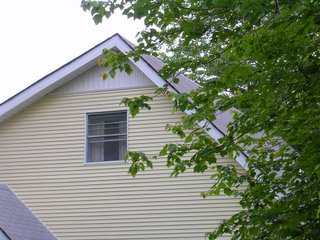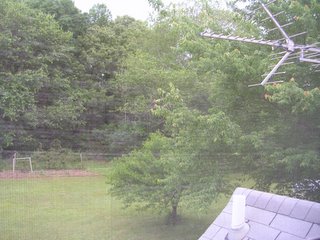
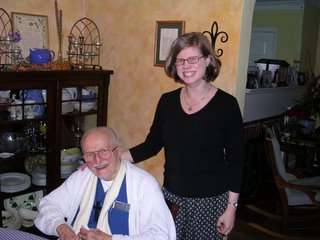
Recently I turned 40. And although I have never been one to fear growing older, for the traditional reasons and various reasons of my own, this particular birthday had me concerned. Would I fall into a funk when it actually hit? Would I suddenly start seeing more gray hair than I already do? Would I begin doubting whether what I'm doing with my life is really what I need to be doing? Etc.
Well, perhaps it helped that I've been busier than usual lately. And certainly it helped that I've had four official parties or dinners with dear ones in my life. And seeing the daffodils, surprise lilies, and flowering quince all make appearances right around the time surely has something to do with the sense of spring in my heart.
But I have to tell about another reason turning 40 hasn't been the dreadful event some would make it out to be.
It's because of Lee Anthony Gerald Stevens, or Father Stevens, as he is known.
I met Father Stevens almost eight years ago, when I was a mere 32. He lived at the retreat center, St. Columba, that I discovered that year. He has listened to me, prayed for me, made me cry, made me laugh, read my poetry, and shared his wisdom over the past eight years. He has become a dear friend.
When I met him, he had already lived longer than most people I knew. At 85, he lived on his own, cooked his own food, and kept more birdfeeders filled than I had ever seen in one place. He spoke with a soft voice and a diction that at first made me think he was British. He led a weekly prayer group, and on his own he prayed for enough people to fill a big three-ring binder.
In the following years, convinced of God's call, he obtained permission to return to the country of Liberia, where he had lived earlier in his life, working among people with leprosy. He had intended to remain in Liberia, but when a co-worker had health problems, Father Stevens accompanied him back to the States. And while he was here, the horrible warfare in Liberia exploded out of control, and he was not allowed to return for reasons of safety.
His heart never left Liberia completely, though, and a few years ago he went back there. He wanted so much to assure the people there that he had not abandoned them. Clearly, they did not hold a grudge. He has told me that some young men walked three days to come and see him when they learned he had returned! As I recall, it was again the political situation (lack of safety) that forced his return to the States, this time to the monastery in New York where he first began his life of ministry.
So, for the past few years he has lived in New York, and we have seen him only when he visits Memphis.
This past summer he came to our home for dinner. As you see in the photo above, he wore shorts and a Bahama-type shirt, and that tee shirt has a big red lobster on it. (He had been visiting relatives in Maine, his native state.) And we learned that evening that he could play more than one blues tune by heart on the piano! (It took just a bit of cajoling, but he clearly loved it as much as we did.)
So, when the phone rang in January and it was him, we invited him over again. He didn't play piano this time, says his arthritis makes it impossible. He leaned a bit more on his cabbage-stalk cane (which belonged to his grandfather!), because in the late summer, he took a fall down a few steps and has had a lengthy recovery. He asked our forgiveness more than once for "going 'round the barn," i.e., going off on tangents and forgetting what he was saying.
Clearly he is not exempt from the effects of aging.
But neither is he letting age rob him of life. He is still raising funds for his beloved Liberia, for ministry to those whose lives are affected by leprosy, and at 93 is making plans to return there again, having recently received a letter of invitation from the bishop.
His eyes are bright, his heart is passionate, he loves deeply and lives boldly. He asked me to play piano for him, Rachmaninoff's Prelude in C-sharp minor. I don't actually play that piece, but saying "no" to Father Stevens is not an easy thing, so I bumbled my way through what I could. I'm not sure he even noticed my mistakes, he was so caught up in the music. It was the first piece he ever played on a recital, and he asked us, "Can you hear the bells? It is just amazing!"
He is a man in love with life, with God, with people, with music, with beauty, with poetry, with nature, with Jesus Christ.
In a letter written a little over a month after his fall, while he was still recuperating in a nursing home, he wrote to me in reference to some struggles I had shared with him,
Put your whole faith in God, dear one. Here is what I live by:
"I have been crucified with Christ, and it is no longer I who live but Christ Jesus who lives in me. And the life I now live in the flesh I live by faith in the Son of God who loved me and gave himself for me."
It works! When we really try . . . he responds . . . And we really begin to live as God intends for us all to live. There will still be crosses to bear just as there were all during Jesus' human life on earth. So don't give up. Believe. Give your heart to him in faith.
You'll see.With a life like his behind those words, one can see they are more than just words.
And turning 40 simply doesn't seem like much more than another step into the life God intends for me to live.
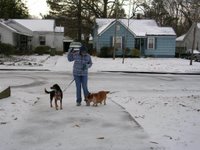 (1) We had more snow!
(1) We had more snow!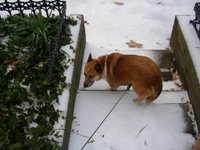 (2) And so you know
(2) And so you know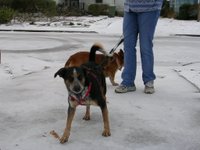 (3) Out for a walk
(3) Out for a walk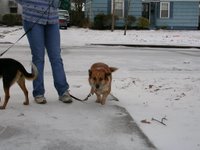 (4) We had to go!
(4) We had to go!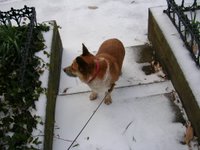 (5) Then home again,
(5) Then home again,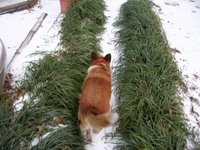 (6) Good things have ends.
(6) Good things have ends.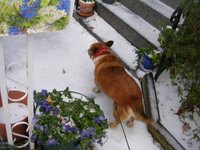 (7) What fun to walk
(7) What fun to walk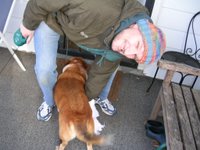 (8) With such good friends.
(8) With such good friends.


